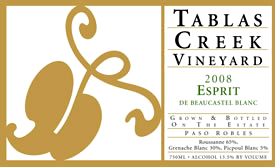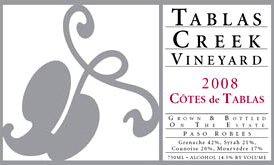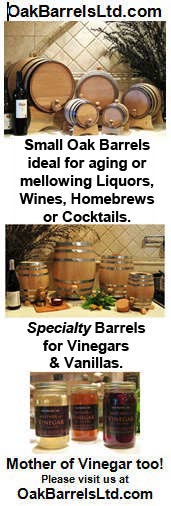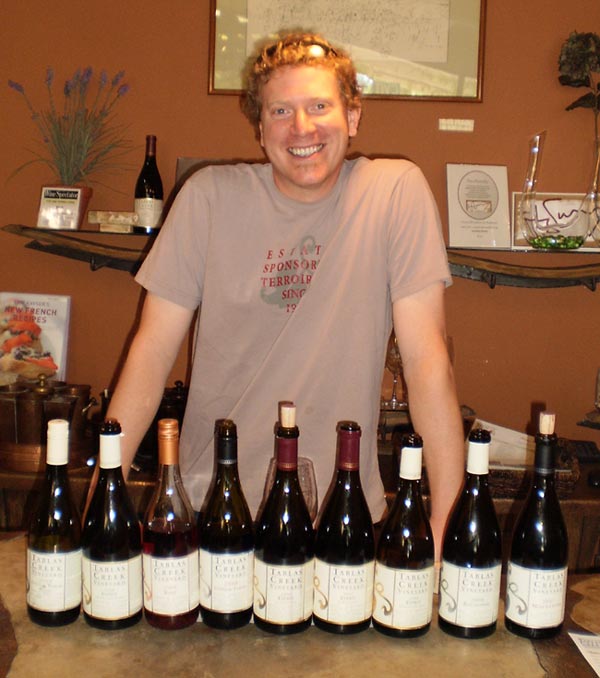A Morning At Tablas Creek
The idea of producing wines from Rhone grape varieties in California was by no means new when Tablas Creek released their initial offerings more than 10 years ago. People like Steve Edmunds and Randall Grahm, to name only two, had already been doing so for years before that, but one had to think that something good would result from a collaboration between the Haas and Perrin families, given their many years of involvement in the wine trade and production. To be honest, I didn’t much care for what I tasted from that inaugural 1997 vintage, but they got it right very soon after that, and by the time I first met Tablas Creek General Manager Jason Haas in the fall of 2006, they were hitting on all cylinders.
Since then, I’ve been a big fan, and indeed, there’s a lot to like about Tablas Creek. Obviously, it all starts with the wines, which generally range from excellent to brilliant, as my colleagues Bennett Traub and Boyce Brannock will attest to. Beyond that, the Tablas Creek website is one of the most informative in the business, listing just about anything you need to know about their history, philosophy and winery programs, such as their VINsider Wine Club, as well as full rundowns individual wines, including food pairing suggestions, with recipes. The Tablas Creek Blog is one of my favorites; there’s always a wealth of information on a variety of wine related subjects, especially with regard to the vineyards and winemaking, and yes, I like to look at the pictures too. And then, there are the vineyards and winery themselves, which we finally took the opportunity to visit for a few hours one morning in early May with our good buddy Frank Joyce.
Upon our arrival, we were greeted by Jason, who started out our tour with a brief talk about the history of Tablas Creek, as seen in the accompanying video.
As we walked towards the vineyards, Jason filled us in on some of the pertinent details of the site. Tablas Creek is located on the west side of Paso Robles, at about 1,500 feet above sea level, in a bowl-shaped area that is one of the coldest spots in the appellation. Their vineyards comprise the largest collection of Rhone varieties in California, and with the exception of Syrah, their cuttings, which have their antecedents at Chateau Beaucastel in Chateauneuf du Pape, have gone into around half of the rest of the Rhone varieties planted in the state. (Between 1993 and 2004, they produced over 2 million for both their own use and for sale to other vineyards.) Their recent production levels are as follows; in 2006, 19,000 cases were produced, dropping to 16,000 cases in 2007 and 2008, and only 12,000 cases in 2009. With 15 more acres in production than in 2006, they’re hoping to produce 20,000 cases this year, and a major expansion of the winery facility is now underway. This winter, the region received 40 inches of rainfall, well above the yearly average of 28 inches, which was most welcome after three years of drought. In the following video, Jason points out particular vineyard plots and notes the respective grape varieties grown in them.
Next, we walked over to the nursery area, where Jason demonstrated grapevine grafting technique, as shown in this video.
We made our way back to the winery, where Jason described the basics of the operations there.
With the tour completed, we went to the tasting room to sample Tablas Creek’s current lineup of wines. Here’re my snapshot impressions:
2008 Tablas Creek Paso Robles Cotes de Tablas Blanc, 42% Viognier, 26% Roussanne, 21% Marsanne, 11% Grenache Blanc, 13.5% alc.: Clean, medium color, with a pretty peach and floral nose that gains a firm minerality on the palate. Full bodied and rich, with good acids; lovely now and should hold over the next 3-5 years. 3000 cases produced. Find this wine
 2008 Tablas Creek Paso Robles Esprit de Beaucastel Blanc, 65% Roussanne, 30% Grenache Blanc, 5% Picpoul Blanc, 13.5% alc.: Clean, medium color, with mineral and white tree fruit on the nose; rich and full bodied, with more depth and mineral than the Cotes de Tablas Blanc, along with a note of rainwater. Not nearly as floral as the previous wine and that’s not a bad thing in this case because it offers excellent promise for development over the next several years. 1800 cases produced. Find this wine
2008 Tablas Creek Paso Robles Esprit de Beaucastel Blanc, 65% Roussanne, 30% Grenache Blanc, 5% Picpoul Blanc, 13.5% alc.: Clean, medium color, with mineral and white tree fruit on the nose; rich and full bodied, with more depth and mineral than the Cotes de Tablas Blanc, along with a note of rainwater. Not nearly as floral as the previous wine and that’s not a bad thing in this case because it offers excellent promise for development over the next several years. 1800 cases produced. Find this wine
2009 Tablas Creek Paso Robles Rosé, 46% Mourvèdre, 39% Grenache, 15% Counoise, 14.5% alc.: Strawberry pink, and somewhat shy on the nose; rich, yet dry, with strawberry, raspberry, cherry and mineral flavors and aromas. Medium-full bodied, with mouth watering acidity, this is bolder than many rosés; as one taster put it, it “demands your attention.” 640 cases produced. Find this wine
 2008 Tablas Creek Paso Robles Cotes de Tablas Rouge, 42% Grenache, 21% Syrah, 20% Counoise, 17% Mourvedre, 14.5% alc.: Clean garnet color, with an attractive, subtly perfumed berry and cherry nose; full-bodied, rich and lovely in the mouth, with discreet earth underneath and good structure. 2300 cases produced. Find this wine
2008 Tablas Creek Paso Robles Cotes de Tablas Rouge, 42% Grenache, 21% Syrah, 20% Counoise, 17% Mourvedre, 14.5% alc.: Clean garnet color, with an attractive, subtly perfumed berry and cherry nose; full-bodied, rich and lovely in the mouth, with discreet earth underneath and good structure. 2300 cases produced. Find this wine
2006 Tablas Creek Paso Robles Esprit de Beaucastel Rouge, 45% Mourvèdre, 28% Grenache, 22% Syrah, 5% Counoise, 14.5% alc.: Clean, dark color, with a pretty plum and dark chocolate perfume; intense but not heavy in the mouth, with a strong streak of minerality. Medium-full-to-full bodied, sleek and well structured for several years of aging and improvement. 2006 Esprit de Beaucastel was named Wine Spectator’s #50 Wine of 2009; 3500 cases produced. Find this wine
2007 Tablas Creek Paso Robles Esprit de Beaucastel Rouge, 44% Mourvèdre, 29% Grenache, 21% Syrah, 6% Counoise, 14.5% alc.: Clean, dark color, and less effusive aromatically than the ’06, but deeper and darker than the previous wine as well, with some meat and iron characteristics. Full-bodied, sleek and well-structured, “this isn’t anywhere near being ready,” according to Jason. 4000 cases produced. Find this wine
We next adjourned to the barrel room to try a few samples and some of the single varietal wines, starting with the successor to the previous two.
2008 Tablas Creek Paso Robles Esprit de Beaucastel Rouge Barrel Sample: Deep, dark plum, berry, iron and graphite; full bodied and intense, with tons of promise.
2008 Tablas Creek Paso Robles Esprit de Beaucastel Rouge “Panoplie” Barrel Sample: Tablas Creek winemaker Neil Collins thinks that this is the best wine he’s ever made, and it’s already attractive in its infancy, with deep, dark black fruit, earth and iron.
2006 Tablas Creek Paso Robles Esprit de Beaucastel Blanc, 65% Roussanne, 30% Grenache Blanc, 5% Picpoul Blanc, 13.5% alc.: Subtle limestone over a nice core of white tree fruit; full-bodied and very smooth, with deceptive acidity to keep everything moving along. Very nice now and will continue to age and develop. 1800 cases produced. Find this wine
2008 Tablas Creek Paso Robles Grenache Blanc, 14.3% alc.: Clean medium color, with white tree fruit and green apple in the background; Frank mentions a note of “faint licorice.” Rich, fresh and very nice. 565 cases produced. Find this wine
2008 Tablas Creek Paso Robles Roussanne, 14.2% alc.: Pale gold with a tinge of lime; peach, pear, lanolin and a hint of unobtrusive oak; big and rich. Received 10% new oak, ½ stainless steel and the rest older oak barrels. 500 cases produced. Find this wine
2007 Tablas Creek Paso Robles Grenache, 90% Grenache, 10% Syrah, 15.3% alc.: Clean garnet color; the pretty floral cherry berry nose gains a little red licorice and mineral in the mouth. Full bodied and a bit chewy; structured for several years in the cellar. 750 cases produced. Find this wine
2007 Tablas Creek Paso Robles Mourvedre, 90% Mourvedre, 10% Syrah, 14.5% alc.: Clean, dark color, darker than most of the other reds; big and rich, with deep, dark leathery, earthy black plum and currant. Very well structured for many years of aging and development. 300 cases produced. Find this wine
2006 Tablas Creek Paso Robles Vin de Paille Rouge, 100% Mourvedre, Sugar at Pressing: 360 g/l, Residual Sugar: 124 g/l, 14.5% alc.: Rich and intense, sweet, but not too sweet, with ripe raspberry and chocolate flavors and aromas. Balanced, with no alcohol burn and good with bitter chocolate or berry tarts. 200 375ml cases produced. Find this wine
2006 Tablas Creek Paso Robles Vin de Paille, 40% Grenache Blanc, 23% Viognier, 20% Roussanne, 17% Marsanne, Sugar at Pressing: 340 g/l, Residual Sugar: 174 g/l, 12.2% alc.: Like drinking peach and apricot marmalade, rich and intense, but again, not at all cloying. I’d forget about pairing both of these with any food and have them for dessert all by themselves! 150 375ml cases produced. Find this wine
After tasting through these, we retired to the patio for a delicious lunch, and we tried yet a few more wines.
2007 Tablas Creek Paso Robles Grenache Blanc: Clean, medium color, with a tinge of lime; rich, effusive white tree fruit shaded with some lanolin and a hint of lime. Very expressive, with lots of acid structure for future development. Find this wine
2006 Tablas Creek Paso Robles Syrah, 90% Syrah, 10% Grenache, 14.5% alc.: Clean, dark color, with ripe dark plum and berry on the nose, following through on the palate with some earthy old wood to give character and make things interesting. Smooth, rich and totally dry; full-bodied, dense and well structured.
900 cases produced. Find this wine
As we were finishing up, I noticed Jason’s father, Robert, founder of Vineyard Brands, sitting a few tables away. Jason called him over to meet us and we had a pleasant chat, which made for a delightful ending to a most enjoyable visit. Many, many thanks to Jason for taking the time to show us what Tablas Creek is really all about, and just how they are making some of the very best wines in California.
Related posts:





Thanks Bob, and agree completely~Jason and the rest of the folks at Tablas are 1st class all the way!
Great notes Geo. I’ve visited about 2 time and got the full treatment much like you did about 3 years ago. A real treat. Many of those wines make it here to MD which keeps me well supplied.
Bob
RT @TablasCreek: Super writeup on a visit to Tablas Creek by @GangofPour including 4 videos and notes on 17 wines http://bit.ly/dCmtJv
RT @TablasCreek: Super writeup on a visit to Tablas Creek by @GangofPour including 4 videos and notes on 17 wines http://bit.ly/dCmtJv
RT @TablasCreek: Super writeup on a visit to Tablas Creek by @GangofPour including 4 videos and notes on 17 wines http://bit.ly/dCmtJv
Super writeup on a visit to Tablas Creek by @GangofPour including 4 videos and notes on 17 wines http://bit.ly/dCmtJv
Our Tablas Creek Vineyard report is up. 4 videos & lots of tasting notes accompany the report http://bit.ly/dCmtJv #wine @TablasCreek